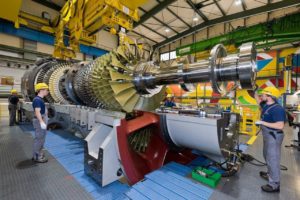
Courtesy of Siemens: Assembly of a gas turbine at Siemens gas turbine plant in Berlin.
Siemens touts gas turbine edge for Thailand
May 08, 2018
GERMAN technology powerhouse Siemens is keen on supplying its cutting edge HL-class gas turbine to customers in Thailand to meet the country’s aim of upgrading to high-efficiency energy with low cost.
Launched last September, the advanced HL-class gas turbines combine a series of new but tested technologies to enhance the next level of efficiency and performance of combined-cycle power plants.
The HL-class is clearing the way to efficiency levels beyond 63 per cent with a mid-term goal to reach 65 per cent.
Thomas Hagedorn, head of sales for the Asia and Pacific region of the Siemens power and gas division, said Thailand has been always a very significant market and one of the biggest in Southeast Asia for the large gas turbine.
“As we continue our cooperation, I believe we would be able to offer HL-class as the next project in Thailand. And EGAT (Electricity Generating Authority of Thailand) is our next target. We are ready to supply it anytime,” Hagedorn told The Nation in a recent interview.
Siemens has provided four power plant projects for EGAT over the past 10 years: Chana 1, Bang Pakong 5, Chana 2, and Wang Noi 4.
And last year, Siemens with its Japanese consortium partner Marubeni Corporation signed a contract with the state-owned utility for the delivery of a turnkey combined cycle power plant named South Bangkok.
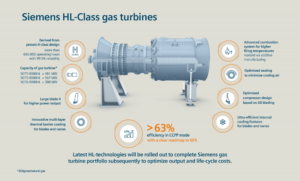
Courtesy of Siemens: Siemens’ new HL-Class turbine
Hagedorn said the cutting-edge machine would benefit the country as the gas price in Thailand is quite high, due in part to the need for energy imports.
“So, it means you need to have a high-efficiency machine to produce affordable electricity. Also, Thailand has plans to replace older-technology plants with next technology,” said Hagedorn.
Thailand depends heavily on gas, accounting for 70-75 per of the country’s energy base, he said.
In his view, the need to diversify the energy mix is high on the country’s agenda. But whereas coal is the cheapest energy source, its social acceptability is under challenge, said Hagedorn, referring to pollution concerns.
“Looking into the challenges, I believe Thailand will continue to build quite significant capacity in gas-fired power plants,” Hagedorn said.
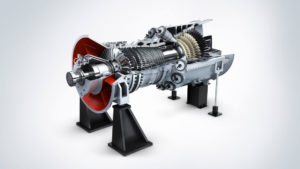 At a presentation to media from Asean countries at Siemens’ gas turbine plant in Berlin last week, Hagedorn, who has spent almost his whole working life in Asia-Pacific countries, said gas-fired power was very important nowadays.
At a presentation to media from Asean countries at Siemens’ gas turbine plant in Berlin last week, Hagedorn, who has spent almost his whole working life in Asia-Pacific countries, said gas-fired power was very important nowadays.
Hence, the new gas turbine is very important because the higher efficiency, the more electricity produced and the less carbon dioxide emitted, he said.
The new HL-class represents an evolutionary development step derived from its proven SGT-8000H technology, said Hagedorn, citing its achievement of greater than 63 per cent efficiency with the mid-term goal to reach 65 per cent.
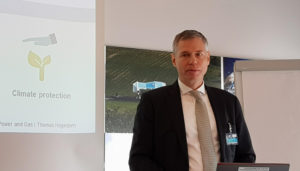
The development of the new class took five years, just half that for the H class, due to the advances in technology and digitalisation that Siemens used in its business operation, Hagedorn said.
Kolja Schwarz, head of HL-class portfolio management, said that Siemens’ specialists developed advanced combustion technologies, innovative multi-layer coatings and improved internal cooling features, as well as an enhanced water-steam cycle that enables the turbines to operate at high-combustion temperatures to achieve optimal performance.
Optimised sealings also minimise air leakage and cooling.
At the same time, evolutionary 3D-blading is enabling higher aero-efficiency for the compressor. Predefined and prefabricated solution elements as well as pre-selected vendors and products allow a significantly reduced construction time and a fast start for projects.
He said the new turbines can be integrated into Siemens’ digital portfolio for plant operators and utilities, including connectivity to MindSphere, the cloud-based operating system for the Internet of Things.
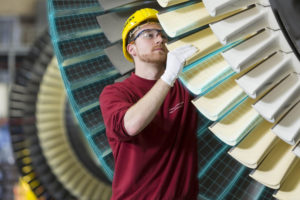
MindSphere offers access to powerful analytics from Siemens and its partners, using intuitive insights in engine operation and decision support to deliver benefits to customers.
All other additional digital services provided in the new class are aimed at avoiding failure, Schwarz said.
For example, if you know the condition of an engine and are aware of the possible risks to its performance, you will be able to step in by changing its operation mode to avoid failure, he said.
The company has a four-year timefame to test and validate the technologies of the HL class at Duke Energy’s Lincoln County site in North Carolina, in the United States.
“It’s a unique opportunity for us to test under real conditions at a customer site,” Schwarz said.
Source: http://www.nationmultimedia.com/detail/business/30344800
